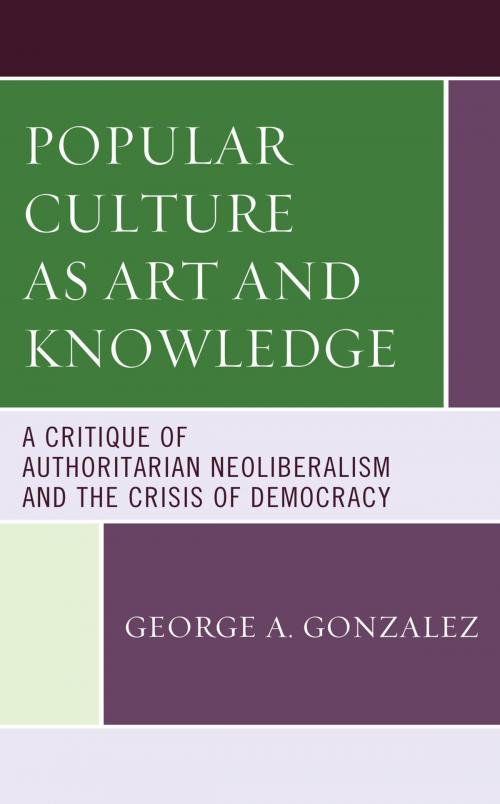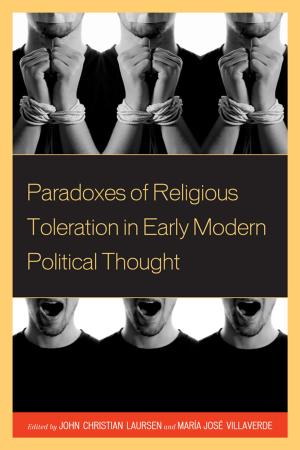Popular Culture as Art and Knowledge
A Critique of Authoritarian Neoliberalism and the Crisis of Democracy
Nonfiction, Social & Cultural Studies, Political Science, Politics, History & Theory, Social Science, Cultural Studies, Popular Culture| Author: | George A. Gonzalez | ISBN: | 9781498589789 |
| Publisher: | Lexington Books | Publication: | January 15, 2019 |
| Imprint: | Lexington Books | Language: | English |
| Author: | George A. Gonzalez |
| ISBN: | 9781498589789 |
| Publisher: | Lexington Books |
| Publication: | January 15, 2019 |
| Imprint: | Lexington Books |
| Language: | English |
This volume settles the debate between analytic and continental philosophy. It turns to art, more specifically popular culture, to demonstrate the validity of continental philosophy. Drawing on the philosophy of Georg Hegel (perhaps the most important of continental philosophers), James Kreines holds that reason in the world metaphysically exists. Reasons of the world are reasons of the Hegelian Absolute. Thus, similar to the fact that gravity is curves in the space-time continuum along which matter moves – reasons are the grooves in the Absolute along which human decision-making occurs. Art allows us to conceptualize, understand, speculate about the grooves (reasons) of the Absolute.
Two key points can be drawn from Kreines’s position: first, normative values are embedded in reality. Thus, in complete contradistinction to analytic philosophy, there is no bifurcation between the empirical and the normative – to exist is to have normative value. Secondly, the role of social science is to cogitate, explore, identify the reasons of the world that shape social, political norms. Such an approach would decisively move the social sciences away from an emphasis on statistically significant patterns of human behavior (e.g., voting studies) and toward an approach that seeks to analyze the reasons of the world that motivate/shape social and political decisions. Art (particularly popular culture) becomes an important source in identifying the way that people reason about the world and how they perceive political elites reasoning in the world.
To adjudicate between continental and analytic philosophy this book on relies on the broadcast iterations of Star Trek, as well as Nazi cinema. With regard to contemporary American politics, in addition to Star Trek, it draws on the television series Game of Thrones, Veep, House of Cards, and The Man in the High Castle. Popular culture is germane to philosophy and contemporary politics because television/movie creators frequently try to attract viewers by conveying authentic philosophical and political motifs. Conversely, viewers seek out authentic movies and television shows. This is in contrast to opinion surveys (for instance), as the formation of the data begins with the surveyor seeking to directly solicit an opinion – however impromptu or shallow.
This volume settles the debate between analytic and continental philosophy. It turns to art, more specifically popular culture, to demonstrate the validity of continental philosophy. Drawing on the philosophy of Georg Hegel (perhaps the most important of continental philosophers), James Kreines holds that reason in the world metaphysically exists. Reasons of the world are reasons of the Hegelian Absolute. Thus, similar to the fact that gravity is curves in the space-time continuum along which matter moves – reasons are the grooves in the Absolute along which human decision-making occurs. Art allows us to conceptualize, understand, speculate about the grooves (reasons) of the Absolute.
Two key points can be drawn from Kreines’s position: first, normative values are embedded in reality. Thus, in complete contradistinction to analytic philosophy, there is no bifurcation between the empirical and the normative – to exist is to have normative value. Secondly, the role of social science is to cogitate, explore, identify the reasons of the world that shape social, political norms. Such an approach would decisively move the social sciences away from an emphasis on statistically significant patterns of human behavior (e.g., voting studies) and toward an approach that seeks to analyze the reasons of the world that motivate/shape social and political decisions. Art (particularly popular culture) becomes an important source in identifying the way that people reason about the world and how they perceive political elites reasoning in the world.
To adjudicate between continental and analytic philosophy this book on relies on the broadcast iterations of Star Trek, as well as Nazi cinema. With regard to contemporary American politics, in addition to Star Trek, it draws on the television series Game of Thrones, Veep, House of Cards, and The Man in the High Castle. Popular culture is germane to philosophy and contemporary politics because television/movie creators frequently try to attract viewers by conveying authentic philosophical and political motifs. Conversely, viewers seek out authentic movies and television shows. This is in contrast to opinion surveys (for instance), as the formation of the data begins with the surveyor seeking to directly solicit an opinion – however impromptu or shallow.















